-
 Bitcoin
Bitcoin $115100
1.27% -
 Ethereum
Ethereum $3675
2.71% -
 XRP
XRP $2.995
1.45% -
 Tether USDt
Tether USDt $1.000
0.02% -
 BNB
BNB $769.8
2.64% -
 Solana
Solana $168.0
3.25% -
 USDC
USDC $0.9999
-0.01% -
 TRON
TRON $0.3371
1.48% -
 Dogecoin
Dogecoin $0.2051
3.36% -
 Cardano
Cardano $0.7394
2.30% -
 Hyperliquid
Hyperliquid $38.15
0.42% -
 Stellar
Stellar $0.3966
-0.36% -
 Sui
Sui $3.486
2.93% -
 Chainlink
Chainlink $16.72
2.52% -
 Bitcoin Cash
Bitcoin Cash $568.0
4.36% -
 Hedera
Hedera $0.2440
2.59% -
 Ethena USDe
Ethena USDe $1.001
0.04% -
 Avalanche
Avalanche $22.16
2.06% -
 Litecoin
Litecoin $119.1
-0.73% -
 UNUS SED LEO
UNUS SED LEO $8.991
0.04% -
 Toncoin
Toncoin $3.232
-0.39% -
 Shiba Inu
Shiba Inu $0.00001233
2.82% -
 Uniswap
Uniswap $9.717
2.53% -
 Polkadot
Polkadot $3.664
1.85% -
 Dai
Dai $1.000
0.01% -
 Monero
Monero $281.2
-3.89% -
 Bitget Token
Bitget Token $4.350
1.55% -
 Cronos
Cronos $0.1428
5.07% -
 Pepe
Pepe $0.00001050
3.68% -
 Aave
Aave $262.3
3.54%
How to remove the Kraken account being marked as high risk?
Kraken's "high-risk" account flag, often restricting trading, results from factors like unusual transactions or KYC/AML inconsistencies. Contacting support, providing documentation, and patiently pursuing resolution are key to regaining full access.
Mar 22, 2025 at 04:29 pm
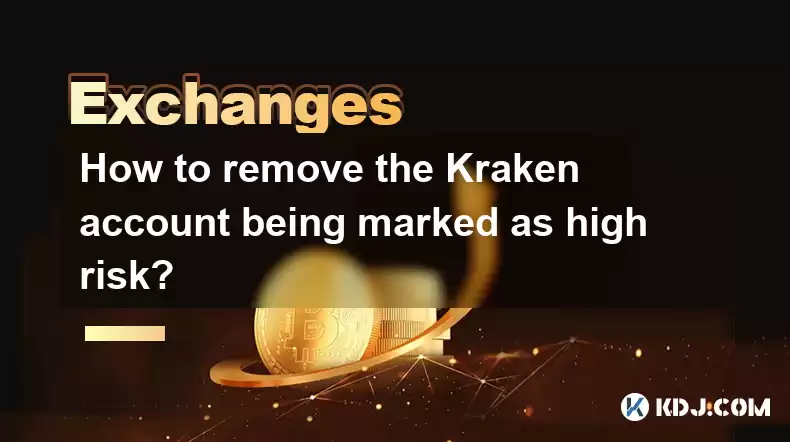
Key Points:
- Kraken's "high-risk" designation stems from various factors, including transaction patterns and KYC/AML compliance.
- Resolution involves understanding the specific reason for the flag and taking corrective action.
- Contacting Kraken support is crucial, providing necessary documentation to prove compliance.
- Reviewing and updating account information, including personal details and transaction history, is vital.
- Long delays are possible; patience and persistent communication are key.
How to Remove the Kraken Account Being Marked as High Risk?
Being flagged as "high-risk" on Kraken, a major cryptocurrency exchange, can severely limit your trading activities. This designation often restricts withdrawals, limits trading volumes, and can even lead to account suspension. Understanding why your account received this label is the first step towards resolving the issue.
Kraken's risk assessment system analyzes various aspects of your account activity. Unusual transaction patterns, such as large deposits or withdrawals in short periods, might trigger a flag. Similarly, inconsistencies in your provided KYC (Know Your Customer) and AML (Anti-Money Laundering) information can also lead to this designation.
The primary method for addressing this issue is direct communication with Kraken's customer support. Clearly explain the situation and provide any supporting documentation that might clarify your transactions or personal details. Be prepared to answer questions about the source of your funds and the purpose of your cryptocurrency activities.
To proactively address potential issues, review your account information. Ensure all personal details, including address and identification documents, are accurate and up-to-date. Thoroughly examine your recent transaction history for any unusual activity that might have triggered the flag. Correcting any inaccuracies or inconsistencies is a vital step.
If you suspect a mistake in Kraken's assessment, gather evidence to support your case. This might include bank statements showing the legitimate source of your funds, documentation related to your business activities (if applicable), and any other relevant information that demonstrates compliance with Kraken's regulations.
Resolving a high-risk designation can be a time-consuming process. Kraken's support team might require time to review your information and verify its accuracy. Be patient and persistent in your communication; regular follow-ups are recommended.
Remember, maintaining a transparent and compliant account is crucial for avoiding future issues. Familiarize yourself with Kraken's terms of service and AML/KYC policies to ensure your activities align with their regulations. Proactive compliance minimizes the risk of future flags.
Understanding the specific reasons behind the high-risk designation is crucial. Kraken may provide some clues in their initial communication, but you may need to actively inquire for specifics. This detailed understanding will help you address the root cause effectively.
The process may involve submitting additional documentation beyond what you initially provided during account verification. This could include tax returns, proof of address, or further details about the origin of your cryptocurrency holdings. Be prepared to provide comprehensive information.
While contacting support is essential, you should also check Kraken's help center and FAQs for troubleshooting tips and potential solutions. This might offer preliminary guidance and answer some of your immediate questions before contacting support directly.
Sometimes, the high-risk designation is a result of a technical glitch or an error in their system. Clearly communicating this possibility to Kraken support could expedite the resolution process. Provide any evidence you might have to support this claim.
Be prepared for multiple rounds of communication with Kraken support. It's unlikely to be resolved with a single email or phone call. Maintain a record of all communication, including dates, times, and the content of your interactions with their support team.
If you believe the high-risk designation is unjustified, you might need to escalate the issue to a higher level of support within Kraken. Their website or communication may outline procedures for escalation, which can help in getting a more senior representative to review your case.
Frequently Asked Questions:
Q: How long does it take to resolve a high-risk account designation on Kraken?
A: There's no set timeframe. It can range from a few days to several weeks, depending on the complexity of the issue and the responsiveness of Kraken's support team.
Q: What happens if my Kraken account remains high-risk?
A: Kraken may further restrict your account, limiting trading or even leading to account suspension. Persistent non-compliance could result in permanent account closure.
Q: Can I appeal Kraken's decision if I disagree with the high-risk designation?
A: Yes, Kraken's support system usually allows for appeals. You'll need to provide compelling evidence to support your case. However, success is not guaranteed.
Q: What are the common reasons for a high-risk designation on Kraken?
A: Common reasons include unusual transaction patterns (large deposits/withdrawals), discrepancies in KYC/AML information, suspected money laundering, and association with high-risk jurisdictions.
Q: Will my high-risk status affect my credit score?
A: No, your cryptocurrency exchange activity does not directly impact your credit score. Credit scores are related to traditional financial institutions and borrowing history.
Disclaimer:info@kdj.com
The information provided is not trading advice. kdj.com does not assume any responsibility for any investments made based on the information provided in this article. Cryptocurrencies are highly volatile and it is highly recommended that you invest with caution after thorough research!
If you believe that the content used on this website infringes your copyright, please contact us immediately (info@kdj.com) and we will delete it promptly.
- Avalanche vs. Ruvi AI: Daily Sales Tell a Story of Crypto Disruption
- 2025-08-07 06:29:35
- DeSoc: The Crypto to Buy Now for a Decentralized Future (and Maybe 43x Gains!)
- 2025-08-07 06:50:16
- Meme Coins in August 2025: Riding the Rally Wave
- 2025-08-07 06:56:08
- Big Whales, Altcoins, and Heavy Transactions: What's Moving the Crypto Market?
- 2025-08-07 06:29:35
- TRX, RUVI, and CoinMarketCap: What's Buzzing in the Crypto Sphere?
- 2025-08-07 05:31:17
- Cryptos Primed for 5x Gains? Ozak AI Spotlights Hot Projects
- 2025-08-07 05:41:42
Related knowledge
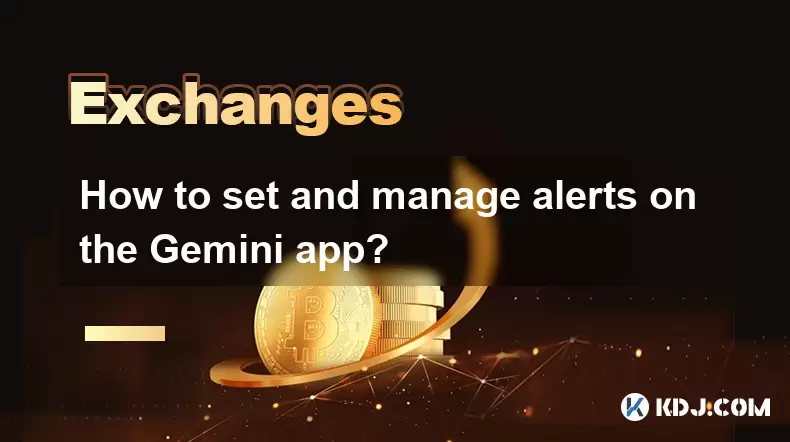
How to set and manage alerts on the Gemini app?
Aug 03,2025 at 11:00am
Understanding the Gemini App Alert SystemThe Gemini app offers users a powerful way to stay informed about their cryptocurrency holdings, price moveme...
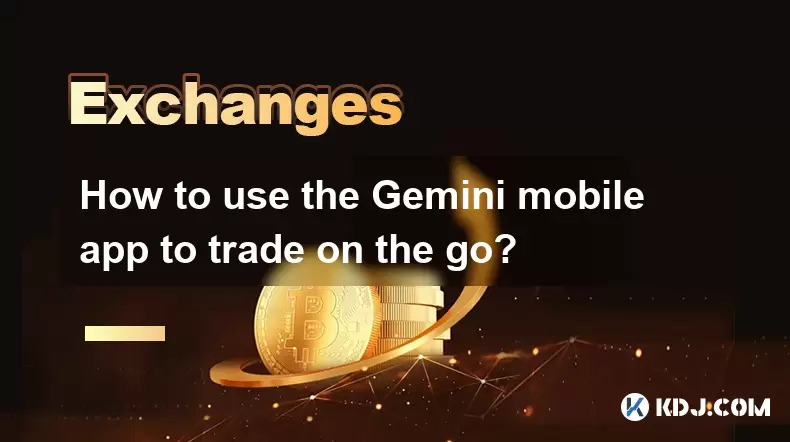
How to use the Gemini mobile app to trade on the go?
Aug 04,2025 at 09:14am
Setting Up the Gemini Mobile AppTo begin trading on the go using the Gemini mobile app, the first step is installing the application on your smartphon...
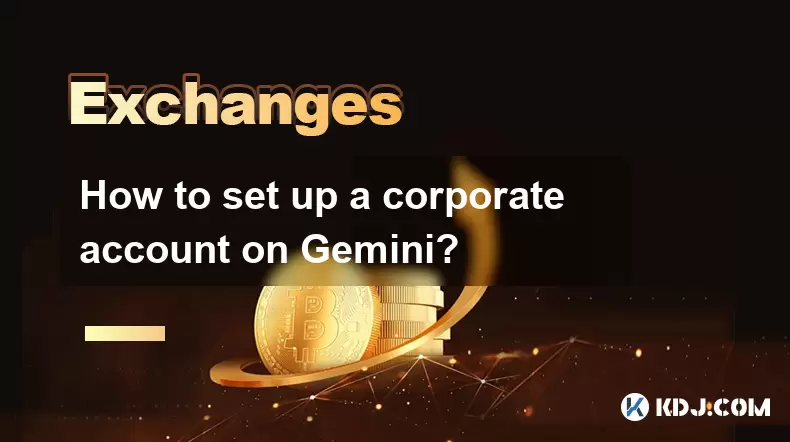
How to set up a corporate account on Gemini?
Aug 05,2025 at 03:29pm
Understanding Gemini Corporate AccountsGemini is a regulated cryptocurrency exchange platform that supports both individual and corporate account crea...
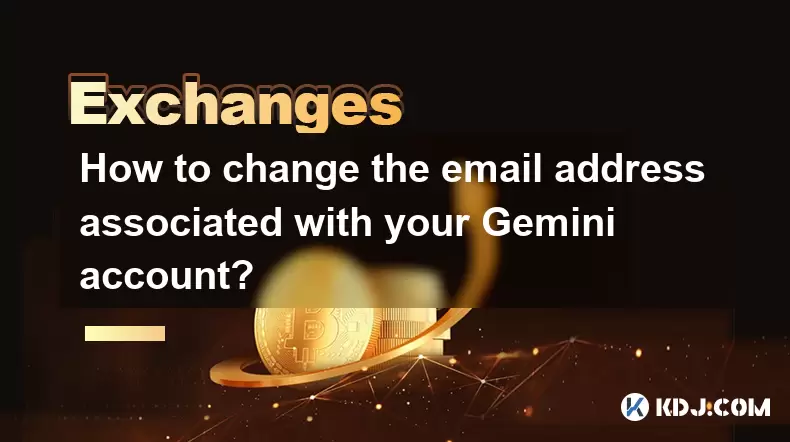
How to change the email address associated with your Gemini account?
Aug 06,2025 at 08:49pm
Understanding the Importance of Updating Your Email on GeminiYour email address serves as a primary identifier and communication channel for your Gemi...
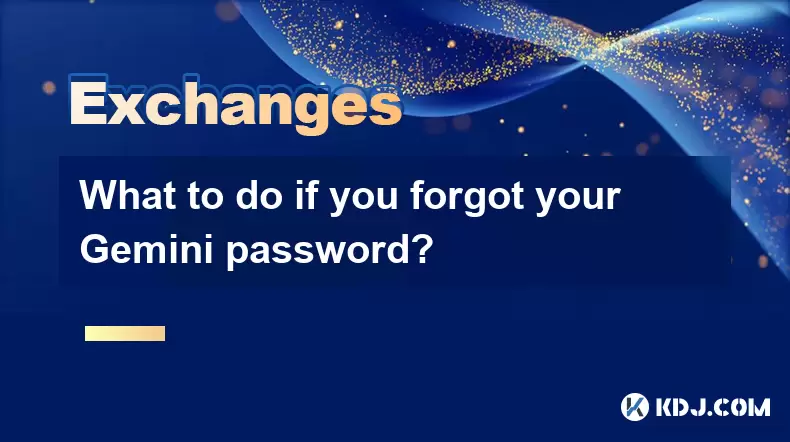
What to do if you forgot your Gemini password?
Aug 04,2025 at 03:42am
Understanding the Role of Passwords in Gemini AccountsWhen using Gemini, a regulated cryptocurrency exchange platform, your password serves as one of ...
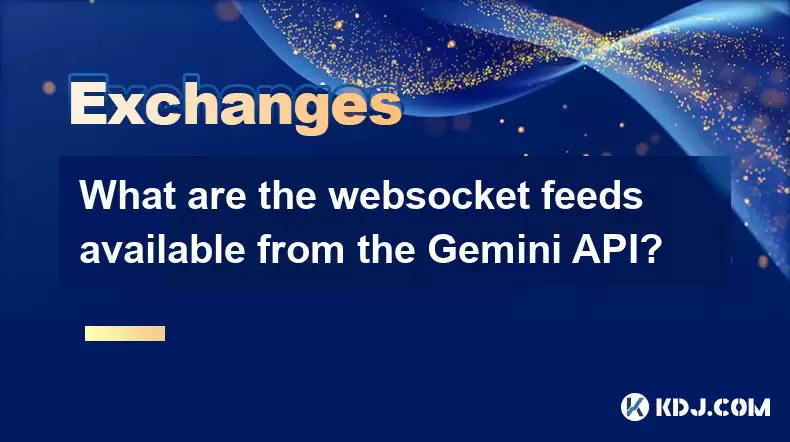
What are the websocket feeds available from the Gemini API?
Aug 03,2025 at 07:43pm
Overview of Gemini WebSocket FeedsThe Gemini API provides real-time market data through its WebSocket feeds, enabling developers and traders to receiv...

How to set and manage alerts on the Gemini app?
Aug 03,2025 at 11:00am
Understanding the Gemini App Alert SystemThe Gemini app offers users a powerful way to stay informed about their cryptocurrency holdings, price moveme...

How to use the Gemini mobile app to trade on the go?
Aug 04,2025 at 09:14am
Setting Up the Gemini Mobile AppTo begin trading on the go using the Gemini mobile app, the first step is installing the application on your smartphon...

How to set up a corporate account on Gemini?
Aug 05,2025 at 03:29pm
Understanding Gemini Corporate AccountsGemini is a regulated cryptocurrency exchange platform that supports both individual and corporate account crea...

How to change the email address associated with your Gemini account?
Aug 06,2025 at 08:49pm
Understanding the Importance of Updating Your Email on GeminiYour email address serves as a primary identifier and communication channel for your Gemi...

What to do if you forgot your Gemini password?
Aug 04,2025 at 03:42am
Understanding the Role of Passwords in Gemini AccountsWhen using Gemini, a regulated cryptocurrency exchange platform, your password serves as one of ...

What are the websocket feeds available from the Gemini API?
Aug 03,2025 at 07:43pm
Overview of Gemini WebSocket FeedsThe Gemini API provides real-time market data through its WebSocket feeds, enabling developers and traders to receiv...
See all articles

























































































